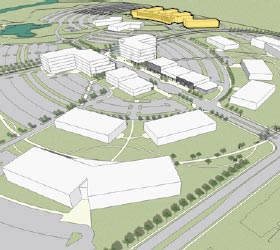
NCI Technology Research Facility Gets Off the Ground
 Ground was broken last week for an advanced technology research facility in Frederick, MD, marking the launch of an NCI research initiative to spur the development of new treatments and diagnostics. The facility will house a number of technology-based research programs currently based at NCI-Fredrick on the nearby Fort Detrick campus. Slated to open in early 2011, NCI will be the "anchor tenant" in the new facility, which is part of a larger research park under development. The majority of the existing NCI-Frederick programs will remain at Fort Detrick.
Ground was broken last week for an advanced technology research facility in Frederick, MD, marking the launch of an NCI research initiative to spur the development of new treatments and diagnostics. The facility will house a number of technology-based research programs currently based at NCI-Fredrick on the nearby Fort Detrick campus. Slated to open in early 2011, NCI will be the "anchor tenant" in the new facility, which is part of a larger research park under development. The majority of the existing NCI-Frederick programs will remain at Fort Detrick.
The work done in the laboratories and related offices relocating to the facility, NCI leaders explained, involves technologies such as biopharmaceutical manufacturing, proteomics, genomics, and nanotechnology, and will form the core of NCI's Advanced Technology Partnerships Initiative (ATPI).
The ATPI, still in its early stages, was launched to expand NCI's ability to build the much-needed collaborations with the private sector that focus on technology-driven translational research, explained NCI Director Dr. John E. Niederhuber.
"This site will be the center of an intensive new effort to bring together government, industry, academic, and nonprofit partners, working side-by-side, utilizing technological resources second to none, to more rapidly translate our latest genetic and molecular discoveries about cancer into effective new treatments that benefit patients," he said.
Initially the facility will provide up to 330,000 square feet of space for offices and state-of-the-art laboratories, explained Dr. Craig Reynolds, director of the Office of Scientific Operations at NCI-Frederick.
The new facility, Dr. Reynolds said, "will provide the physical infrastructure to carry out the ATPI." Most of the NCI laboratories moving to the new facility are part of NCI's Advanced Technology Program or Biopharmaceutical Development Program. "They were chosen because they fit both of the criteria for the ATPI: they involve advanced technologies and are areas in which both industry and academia have strongly indicated they would like to partner."
As is the case with NCI-Frederick - one of only 38 Federally Funded Research and Development Centers, and the only one solely dedicated to biomedical research - this new research facility will be operated by SAIC-Frederick, a private contractor.
NCI operations currently housed in 33 different buildings on the NCI-Frederick campus and at satellite offices will move to the new facility. Many of these buildings, Dr. Reynolds stressed, are aging (most were built during World War II) and cannot provide the space or amenities needed to undertake the types of partnerships expected to emerge under the ATPI.
"We're proud of the work we've been able to do in these facilities," he said. "But the new facility will provide state-of-the-art space to work with collaborators from industry and academia, as well as to train the next generation of scientists on how to use advanced technologies."
The new facility should help free up space on the Fort Detrick campus to enhance other programs and core services that support both the intramural and extramural cancer research community, he added.
"The new facility," says Dr. Niederhuber, "embodies the vision of NCI as a cancer research campus where private sector research and development programs can
co-locate with other extramural institutions and join forces with federal labs to understand cancer and develop interventions that will prevent, diagnosis, and treat the disease."
—Carmen Phillips
|